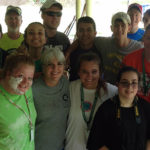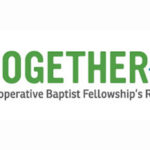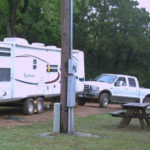ONALASKA—Churches cannot afford to neglect ministry to homebound adults, a veteran senior adult minister told a Texas Baptist workshop.
America is aging, and churches need to respond to the demographic reality, Randall Perry, associate pastor of adult discipleship and senior adults at First Baptist Church in Waco, told participants at a senior adult workshop at First Baptist Church in Onalaska.
 Churches cannot afford to neglect ministry to homebound adults, Randall Perry, associate pastor of adult discipleship and senior adults at First Baptist Church in Waco, told participants at a senior adult workshop at First Baptist Church in Onalaska. (PHOTO / George Henson)In 1900, 3 percent of the American population was 65 years old or more, Perry noted. In 2010, that segment of the population reached 22 percent. In 2030, a projected 35 percent of Americans will be over the age of 65.
Churches cannot afford to neglect ministry to homebound adults, Randall Perry, associate pastor of adult discipleship and senior adults at First Baptist Church in Waco, told participants at a senior adult workshop at First Baptist Church in Onalaska. (PHOTO / George Henson)In 1900, 3 percent of the American population was 65 years old or more, Perry noted. In 2010, that segment of the population reached 22 percent. In 2030, a projected 35 percent of Americans will be over the age of 65.
“It’s going to be very important that our churches recognize the need for developing a ministry to homebound adults,” Perry said.
A congregation is supposed to be a spiritual family, he reminded participants.
“Can you imagine what it would be like if you ignored the older generation of your family? What would people think about you if they were never visited? If their needs were never addressed? We would be talked about forever,” Perry said. “There are churches that never even think about the needs of the homebound adults in their church.”
Homebound ministry shows appreciation to senior adults.
“Many of our homebound members were active and faithful—making the church what it is today,” he said.
Most churches fall short
Sign up for our weekly edition and get all our headlines in your inbox on Thursdays
Even so, most churches fall short.
“In most churches, there is a gap between the needs of homebound senior adults and the church’s ministry to meet those needs,” Perry said.
To bridge that gap, each church needs to make an assessment of the needs of the congregation’s homebound adults.
To identify those people, a month-long campaign needs to be waged periodically, asking the congregation for names and contact information for homebound adults they know. That plea should be included in every church publication for maximum effectiveness, he said. Every time Perry has tried this blitz, the church has discovered new names.
“This can be an outreach tool, because they will turn in the names of homebound adults who are not members of your church. The tendency is to say, ‘We don’t need to minister to them, because they are not members of our church.’ But their church may not be doing anything for them,” Perry said.
Survey te needs
Next, volunteers must go to the homes to survey the needs of those individuals.
“You don’t want to duplicate what already is being done. If Meals on Wheels is already bringing them food, that’s already being taken care of,” he pointed out as an example.
In Perry’s experience, the homebound experience problems in three areas—loneliness, transportation and lack of spiritual enrichment.
To combat loneliness, volunteers need to visit at least once a month. The volunteers in Perry’s ministry bring small gifts as well, usually made by the children of the church.
“It lets them know they are thought about and cared for by the children of the church,” he said.
The church places postcards on tables on during Wednesday night services so members can write encouraging notes to those unable to attend church.
“We mail those to them, reminding them that our church is thinking of them and praying for them,” Perry said.
The church also provides poster-sized birthday cards for the congregation to sign, which are delivered by the person who regularly visits that particular homebound person.
Offer transportation
Volunteers can offer transportation to the doctor, drug store, grocery store and church.
“Some volunteers don’t want to commit to making a monthly visit, but they will agree to providing sporadic transportation,” he said.
Most spiritual needs stem from feeling disconnected from their spiritual family—the church, Perry said.
“You cannot imagine how deep-seated some of this feeling is. We always alert our first-time visitors that they may be the first contact to this homebound adult in a long, long time. They should let them vent about that lack of attention and assure them we’re going to do a better job in the future,” he said.
One way of meeting that need is for the visitors to deliver large-print devotional materials quarterly.
“When you do that, as they do their devotional reading, they think every day about how much their church cares for them by providing that for them,” Perry said.
The church also provides a recorded Sunday school lesson. Classes are encouraged to announce who is present so they will feel more included.
Televise services
First Baptist Church in Waco televises its services, so a deacon and minister deliver individual servings of the Lord’s Supper during the week prior.
“They are encouraged to wait and take the Lord’s Supper with the rest of the church,” he said.
“This is very meaningful to them, because for the majority of them, it’s been forever since they’ve observed the Lord’s Supper with their congregation.”
It is not a one-way ministry, however.
“This is a blessing to the person making the visit,” he said. “I don’t want this to sound like a burden. I get notes constantly about what a blessing the relationship they’ve established with their homebound adult is.”














We seek to connect God’s story and God’s people around the world. To learn more about God’s story, click here.
Send comments and feedback to Eric Black, our editor. For comments to be published, please specify “letter to the editor.” Maximum length for publication is 300 words.